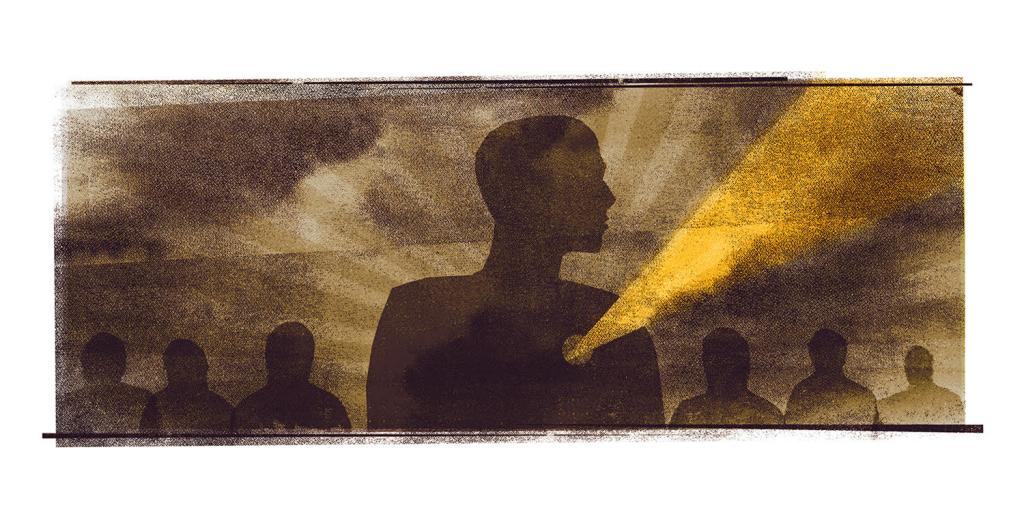 Original art by Brian C. Jocks
Original art by Brian C. Jocks
Four thoughts on this Sunday’s lectionary:
ON THE PRESENCE OF GOD
When I doubt God’s presence in the world or in my life, I can always find him, there, in the cacophony of my doubt. When I suspect that prayer is superstitious, when I am almost certain that I’m just too weak and fucked up to live without this idea of “God,” when my faith is an oppressive family heirloom, when my belief thickens into thinness, today’s Gospel runs through my head.
“Where two or more are gathered, there I am in their midst.”
In the midst of my confusion, in the folded divisions of my self, in that messy gathering of interiority, even there God arrives through the promise of scripture made to his disciples. I am many; God is here. Walt Whitman’s dictum – “I contain multitudes” – is a criteria for the ever-presence of God. Even when I think about how ridiculously circular this is or how I am not an apostle of the first order, I am eventually wrapped and knotted in that mess of God. My struggle slows, my breathe settles, and I am suffocated into submission. My binds loosen me.
ON THE LOVE OF NEIGHBOR
Christ’s commandment “love your neighbor as yourself,” that Paul repeats to the Romans in the second reading, obsessed Sigmund Freud in Civilization and Its Discontents. He considered it the example par excellence of the the cultural super ego. To Freud, this command was an absolutely impossible demand; its rigor must have appealed to Paul’s Stoicism-obsessed audience in Rome at the time, too.
I don’t see this command as particularly demanding in our time. To love my neighbor as myself, I need to actually have real neighbors. We don’t really have neighbors anymore. So I’m not sure what to do about the command to love them. For me this command is today a call to the lost arts of porch sitting or sugar lending and other folk cliches. Or maybe it begins in seeing the first true neighbor: myself. Self-hatred would violate this command more than anything else I can think of.
ON THE WICKED AND THEIR GUILT
Ezekiel is warned by the Lord about how he is to treat the wicked and what consequences await him if he fails to speak out. In short, the Lord seems to be reminding Ezekiel that he cannot neglect the role of the prophet and expect to be safe as a result. But the wicked suffers the same fate regardless. “He shall die for his guilt,” no matter what the prophet says. If the wicked does not turn from his way, he pays for it no matter what.
Prophets never really inspire me, but wickedness I can relate to. This is a good wake up call for me: when you’re the wicked, the faults of the prophets and priests should not make you feel too good. Sure, they may be fucked for their neglect of you, but you’ll get yours, too.
This reminds me of the criminal who stole heaven, while hanging out with Jesus on the cross. Unlike the prophetic reverence of Muslims, for Christians Jesus was not a prophet and we can see that in action in his salvific guarantee to the thief. He is the Lord, not Ezekiel. When the wicked turn from their ways they must turn to the Lord, not the prophet.
ON HARD-HEARTEDNESS
Track nine on D’Angelo’s 2014 album, Black Messiah, is a love anthem to the beloved. It is titled “Betray My Heart.” The chorus repeats the simple promise “I will never betray my heart.” The song is an act of fidelity to the beloved through a commitment to stay true to one’s own heart. It is usually the case that the lover seeks the truth of the beloved’s heart, but there is something more resolute about this version of the truth. The truth of the lover’s love of the beloved is preserved inside the lover himself; there the lover’s heart beats out the meter, the interval that unites him to the beloved.
“If today you hear his voice, harden not your heart,” says Psalm 95. I would respond with D’Angelo’s promise to the beloved. “I will never betray my heart.”
We may think that the Divine voice should not harden anyone’s heart just as the lover should be true to the beloved’s heart, not his own. But the Psalmist’s wit teaches us that, as Paul put it in Romans, “what I hate I do.” So, instead of totally opening my heart to God’s voice, I try to heed the Psalmist’s minimalist exhortation, settling for the avoidance of the hard artery that leads to death. In this way, the voice of God asks us to affirm the life within our hearts, not the openness or closedness that is foreign to it.
Sam Rocha teaches at the University of British Columbia. He is author, most recently, of Tell Them Something Beautiful: Essays and Ephemera.












